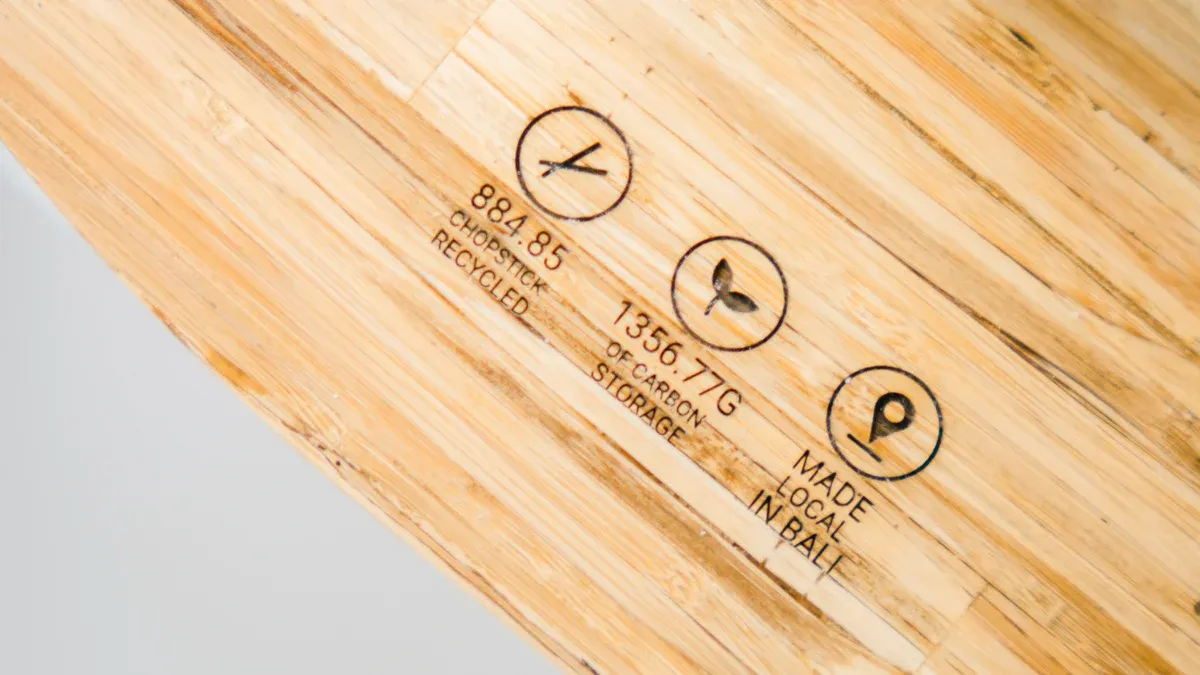Choosing a 100% Natural Organic Bamboo Cutting Board not only protects your health but also supports the planet. Look for features like sustainable sourcing and a formaldehyde-free bamboo cutting board to ensure safety. Some boards may use harmful chemicals or poor-quality glue, which can crack and harbor bacteria. Opt for a moisture-resistant bamboo board that meets thickness standards for organic bamboo boards to guarantee durability and safety.
Key Takeaways
- Check for labels like USDA Organic and FSC to confirm your bamboo cutting board is organic and safe.
- Pick boards with safe coatings like mineral oil or beeswax to keep harmful chemicals out of your kitchen.
- Watch out for strange finishes or very cheap prices, as these might mean the board is not good quality or safe.
What Does “Organic” Mean for a 100% Natural Organic Bamboo Cutting Board?

When you see the term “organic” on a bamboo cutting board, it signifies more than just a label. It reflects a commitment to health, safety, and sustainability. Organic bamboo cutting boards are crafted without harmful chemicals or adhesives, ensuring they are safe for food preparation. They also prioritize solid construction, which enhances durability and reduces the risk of cracking or warping.
Certifications that define organic bamboo products
Certifications play a crucial role in identifying truly organic bamboo cutting boards. Look for these internationally recognized certifications:
- USDA Organic Certification: This certification ensures that the bamboo cutting board meets the strict standards of the USDA National Organic Program. It involves thorough audits by approved certifying bodies to verify the absence of harmful substances.
- FSC Certification: The Forest Stewardship Council certification guarantees that the bamboo used in the product is harvested sustainably. It is a globally trusted mark of responsible forestry practices.
These certifications provide transparency and help you make informed choices when selecting a 100% Natural Organic Bamboo Cutting Board.
Standards for adhesives and finishes
The adhesives and finishes used in bamboo cutting boards must meet specific safety standards. For adhesives, the U.S. Code of Federal Regulations (21CFR) defines acceptable materials as indirect food additives. While the FDA does not directly approve adhesives, it ensures that their raw materials are safe for use.
For finishes, mineral oil and wax are common choices. These finishes do not form a film on the surface, which prevents bacteria from accumulating. By adhering to these standards, manufacturers ensure that their cutting boards are both safe and functional.
Sustainable sourcing practices
Sustainability is a key aspect of organic bamboo products. Bamboo grows rapidly and regenerates without the need for replanting, making it an eco-friendly resource. However, not all bamboo is sourced responsibly. To ensure sustainability, manufacturers must follow ethical harvesting practices and avoid overexploitation. Certifications like FSC further confirm that the bamboo is sourced in a way that protects the environment and supports local communities.
By choosing a 100% Natural Organic Bamboo Cutting Board with sustainable sourcing, you contribute to environmental conservation while enjoying a high-quality product.
Practical Tips for Spotting Fake 100% Natural Organic Bamboo Cutting Boards
Spotting a fake 100% Natural Organic Bamboo Cutting Board can save you from potential health risks and wasted money. By following these practical tips, you can ensure that the cutting board you choose is truly organic and safe for your kitchen.
Check for certifications and labels
Certifications and labels are the first indicators of authenticity. Reliable certifications, such as USDA Organic and FSC, confirm that the bamboo cutting board meets strict organic and sustainability standards. To verify these claims, follow these steps:
- Look for third-party audits. For example, brands like Bambu undergo inspections by internationally accredited certifying bodies like LETIS.
- Check if the product has undergone annual inspections. These audits ensure that the cutting board consistently adheres to organic standards.
- Confirm pesticide-free production. Certification processes often include tests to verify that no harmful chemicals or pesticides were used during bamboo cultivation.
Additionally, you can reference certification databases like the USDA Biobased products database. This resource lists items that meet renewable agricultural resource standards, helping you identify eco-friendly options.
Inspect for unnatural finishes or coatings
Unnatural finishes or coatings can indicate that a bamboo cutting board is not truly organic. Authentic boards typically use food-safe finishes like mineral oil or beeswax. These finishes enhance durability without introducing harmful chemicals.
To spot unnatural finishes:
- Examine the surface of the board. A glossy or overly smooth finish may suggest the use of synthetic coatings.
- Smell the board. A strong chemical odor could indicate the presence of harmful substances like formaldehyde or bleach.
If you notice any of these signs, the cutting board may not be safe for food preparation.
Use tools like formaldehyde test strips
Formaldehyde is a common chemical found in low-quality bamboo cutting boards. It poses health risks, especially when used in food preparation. You can use formaldehyde test strips to check for this harmful substance.
Here’s how to use them:
- Place the test strip on the surface of the cutting board.
- Follow the instructions provided with the test strip to interpret the results.
- If the test detects formaldehyde, avoid using the cutting board for food preparation.
These tools are affordable and easy to use, making them a practical option for verifying the safety of your cutting board.
By following these tips, you can confidently choose a 100% Natural Organic Bamboo Cutting Board that is safe, sustainable, and truly organic.
Common Red Flags in 100% Natural Organic Bamboo Cutting Boards

Misleading marketing terms without proof
Some brands use vague or misleading terms to market their bamboo cutting boards. Words like “eco-friendly” or “natural” may sound appealing but often lack evidence to back them up. You should look for specific claims supported by certifications or detailed product descriptions.
Tip: If a product claims to be a “100% Natural Organic Bamboo Cutting Board,” check for certifications like USDA Organic or FSC. These labels provide proof of authenticity and ensure the product meets organic standards.
Avoid boards with overly generic marketing language. These terms may hide the use of harmful chemicals or unsustainable practices.
Lack of certifications or transparency
Authentic organic bamboo cutting boards come with certifications that verify their quality and sustainability. If a product lacks certifications, it may not meet organic standards. Transparency is equally important. Brands should provide clear information about their sourcing, manufacturing processes, and materials.
Use the following checklist to evaluate transparency:
- Does the brand disclose its sourcing practices?
- Are certifications like USDA Organic or FSC visible on the packaging?
- Is there detailed information about adhesives and finishes?
If you can’t find answers to these questions, the product may not be truly organic.
Suspiciously low prices
A bamboo cutting board priced significantly lower than others may raise concerns. High-quality organic bamboo requires sustainable harvesting, safe adhesives, and food-grade finishes. These factors contribute to the cost.
Cheap boards often cut corners by using low-grade bamboo, synthetic finishes, or harmful adhesives. These shortcuts compromise durability and safety.
Note: Investing in a certified 100% Natural Organic Bamboo Cutting Board ensures long-term quality and protects your health.
When comparing prices, consider the certifications, materials, and finishes. A slightly higher price often reflects better quality and sustainability.
Benefits of Choosing a Truly Organic Bamboo Cutting Board
Health benefits of avoiding toxic chemicals
Choosing a truly organic bamboo cutting board helps you avoid exposure to harmful chemicals. Many non-organic boards use adhesives containing formaldehyde or finishes with toxic substances. These chemicals can leach into your food, posing health risks over time. Organic bamboo boards, on the other hand, use food-safe adhesives and natural finishes like beeswax or mineral oil. These materials ensure your food stays free from contaminants.
Additionally, organic bamboo boards resist absorbing odors and bacteria. This makes them a safer option for food preparation. By selecting a certified organic board, you protect your health and enjoy peace of mind in your kitchen.
Environmental advantages of sustainable bamboo
Sustainable bamboo offers significant environmental benefits compared to conventional materials. When you choose a bamboo cutting board, you support a resource that:
- Regrows in under four months, unlike trees that take decades to mature.
- Absorbs twice as much carbon dioxide as trees, helping reduce greenhouse gases.
- Produces 30-35% more oxygen than an equivalent stand of trees, improving air quality.
Bamboo’s rapid growth and minimal need for pesticides make it an eco-friendly choice. By opting for a sustainably sourced bamboo cutting board, you contribute to environmental conservation and reduce your carbon footprint.
Long-term durability and quality
Organic bamboo cutting boards stand out for their durability and performance. They are gentle on knife blades, unlike plastic or composite boards, which can dull knives quickly. Bamboo boards also resist warping, staining, and deep cuts better than many alternatives. For example, brands like Greener Chef have proven to last longer under regular use.
Plastic boards, while dishwasher safe, often need frequent replacement due to wear and tear. In contrast, bamboo boards maintain their quality with proper care. Their natural antimicrobial properties also make them more sanitary than plastic boards, which can harbor bacteria in deep grooves. By investing in an organic bamboo cutting board, you ensure long-term value and a safer cooking experience.
Identifying truly organic bamboo cutting boards protects your health and the environment. Certifications like USDA Organic ensure safety and sustainability, but verifying claims is essential due to rising fraud. Organic products reduce toxins and support eco-friendly practices. Research brands, check certifications, and use tools like formaldehyde test strips to confirm authenticity.
Post time: May-10-2025